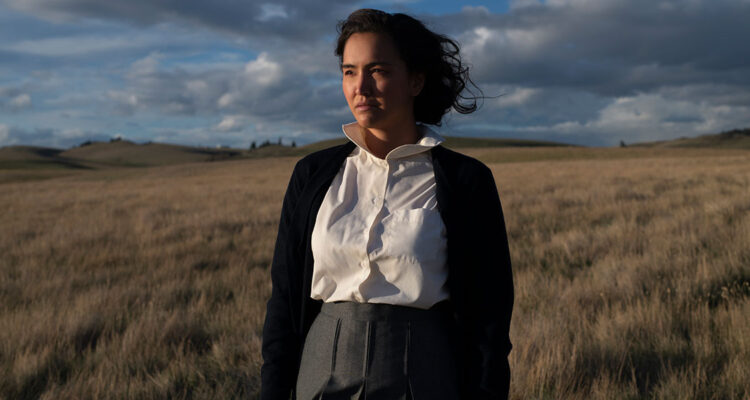After the 2021 discovery of hundreds of unmarked graves on school grounds in British Columbia, the dark history of Canada’s residential school system and its traumatic impact on generations of Indigenous families once again became international news. Outrage and sorrow poured out from survivors across the country. The scandal even prompted Pope Francis to issue a formal apology for the Catholic Church’s role in these atrocities. Yet, while the last of these federally funded schools closed in 1997 (!), thousands of families remain forever altered by what happened inside them.
The story of one of these survivors is at the heart of the piercing drama “Bones of Crows.” Inspired by actual events, writer-director Marie Clements has crafted a true epic in terms of its visual scope – with bold cinematography from Vince Arvidson – and its emotional landscape. Spanning from the 1920s and continuing for nearly a century, the film centers on Cree matriarch Aline Spears (played at different ages by three actresses), who, along with her siblings, is forcibly removed from her parents and forced to attend one of these so-called boarding schools.
READ MORE: TIFF 2022: 16 Must-See Films To See At The Toronto Film Festival
Told in a non-linear fashion, pre-teen Aline and her siblings attempt to survive this new, hostile environment while keeping their family unit together – despite the school’s attempts to separate the children. Aline has a gift – she can play the piano – which should be her ticket out of abuse, and is for a while until her gift becomes a curse. Newcomer Summer Testawich plays young Aline with stifled ferocity, always ready to rebel but wise enough to know escape takes planning and time. Aline must navigate a tricky relationship with nasty nun Sister Ruth (Karine Vanasse, “Revenge”) and her protector Thomas (Jonathan Whitesell, “Chilling Adventures of Sabrina”), under whose benevolent piano lessons lurks evil urges.
This ferocity is picked up by Grace Dove (“The Revenant”) in what should be a star-making turn as the teenage and adult Aline. Her only hope to escape the school is to join the military, where eventually she finds work as a code talker during WWII. The irony is not lost here. Aline’s fluency in Cree is now an asset to the government, the same government that spent years trying to beat her culture – including this language – out of her.
Trauma follows Aline and her husband Adam (a soulful Phillip Lewitski, “Utopia Falls”) home as they return to a country that still doesn’t see them as citizens, despite their heroism and sacrifices during the war. While Aline’s little sister Perseverance (played as an adult by a captivating Alyssa Wapanatâhk, soon to be Tiger Lily in David Lowery’s upcoming “Peter Pan & Wendy”) finds herself drawn into the dangerous world of crime and prostitution, Aline does her best to keep her family together.
READ MORE: Fall 2022 Preview: 60+ Must-See Films To Watch
While Clements’s script touches on seemingly every possible kind of trauma, abuse, and prejudice faced by Ingenious people, it never once feels like a pile. Through Maxime Lahaie’s excellent editing, the story weaves in and out of the different timelines with ease, allowing the weight of each moment to settle and each agony room to breathe fully. This pacing focuses the story on Aline’s growing fortitude rather than dwelling on her suffering. It is a credit to Dove’s immense talent, as she carries the emotional weight of this woman and the film so squarely on her shoulders.
As the elder Aline, Carla-Rae (“Rutherford Falls”) brings a quiet dignity and that same mighty ferocity. She condemns her treatment as a child directly to the head of the Catholic Church while telling her story entirely in Cree. It is a powerful moment, a culmination of these three performers working in lock-step with Clements to show in two hours how a matriarch is made in the fires of adversity.
The filmmakers have tackled a difficult subject with tact and grace, never once falling for sensationalism or cheap sentimentality. Envisioned initially as a 5-hour limited series in the vein of “Roots,” due to funding issues, the creative team followed the path of Olivier Assayas’s “Carlos” and developed the series and the film concurrently. This longer version of “Bones of Crows” is set to air on CBC next year, and as the film comes to a close, it does feel both like a story told to completion and, at the same time, one filled with such rich storytelling and complex characters that I could easily see spending another several hours in its world. It’s surely a subject that deserves as much. [A-]
Follow along with all our coverage of the 2022 Toronto International Film Festival.
Support is available 24 hours a day for anyone affected by their experience at residential schools and for those who may be triggered by content dealing with residential schools, child abuse, emotional trauma, and racism. The national Indian Residential Schools Crisis Line is available at 1-866-925-4419.

